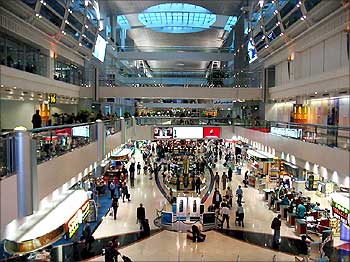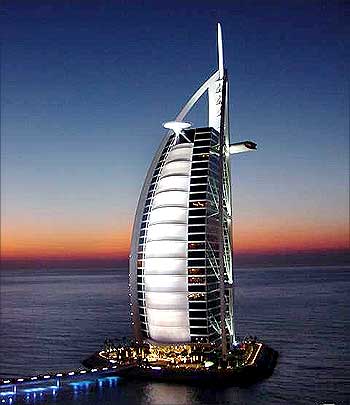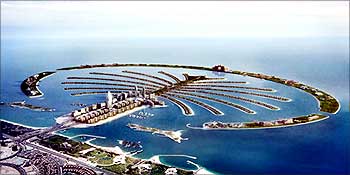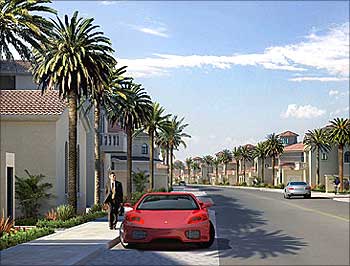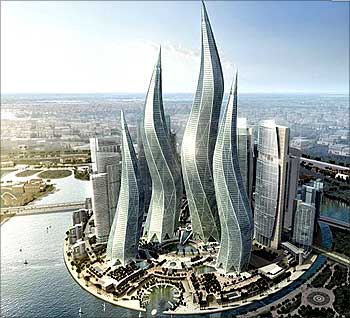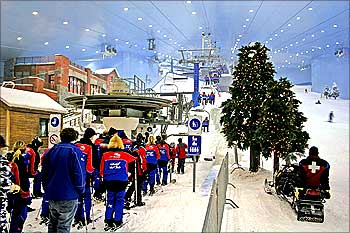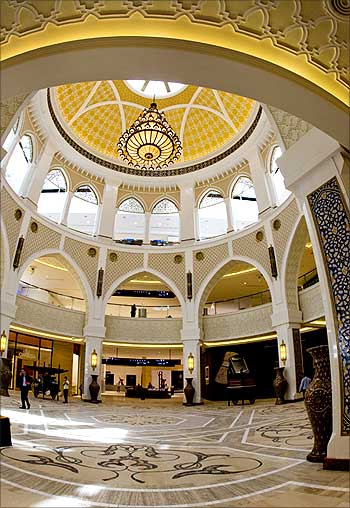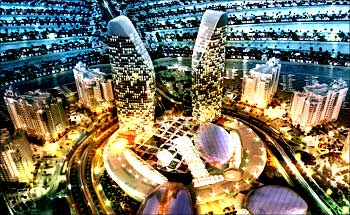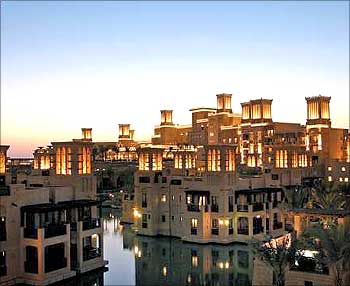How recession hit glitzy Dubai and expats
Last updated on: July 21, 2009
Image: Dubai Airport
What a comedown since autumn 2008, till when, according to some estimates, 20 per cent of the world's construction cranes were deployed in Dubai. Ever since oil began to flow from the Umm Shaif offshore field in 1962, this tiny but immensely rich emirate had morphed into a world class metro.
Until 2008, residential property in Dubai was on steroids, growing at an annual rate of 48 per cent, considered a safe investment for all of the world's rich.
It resulted in developments such as Palm Jumeirah and Burj Dubai, the world's tallest tower, and spawned extravagance beyond imagination - the gala opening of the Atlantis, a super-luxury resort on the tip of Palm Jumeirah, in November 2008, was a case in point.
By then, the tremors of the collapse of the global economy were being felt in Dubai too, but it went ahead with the inaugural ceremonies with the world's A-list celebrities in attendance, the world's most expensive fireworks on display on the world's largest manmade island that has added 78 kilometers to Dubai's shoreline.
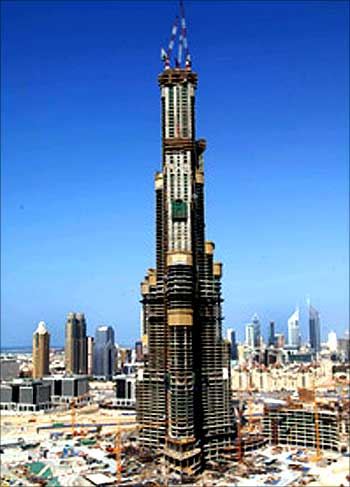
Image: Burj Dubai
Photographs: Burj Dubai Website
What a comedown since autumn 2008, till when, according to some estimates, 20 per cent of the world's construction cranes were deployed in Dubai. Ever since oil began to flow from the Umm Shaif offshore field in 1962, this tiny but immensely rich emirate had morphed into a world class metro.
Until 2008, residential property in Dubai was on steroids, growing at an annual rate of 48 per cent, considered a safe investment for all of the world's rich.
It resulted in developments such as Palm Jumeirah and Burj Dubai, the world's tallest tower, and spawned extravagance beyond imagination - the gala opening of the Atlantis, a super-luxury resort on the tip of Palm Jumeirah, in November 2008, was a case in point.
By then, the tremors of the collapse of the global economy were being felt in Dubai too, but it went ahead with the inaugural ceremonies with the world's A-list celebrities in attendance, the world's most expensive fireworks on display on the world's largest manmade island that has added 78 kilometers to Dubai's shoreline.
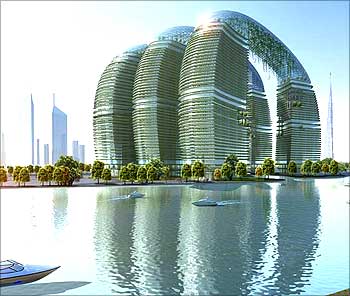
Image: Meraas Jumeirah Gardens Project
Photographs: Meraas Jumeirah Gardens Website
The event was guaranteed to awe potential customers and reassure investors, but soon after property rates in the sheikhdom dropped by an extraordinary 40 per cent - outpacing falls elsewhere in the world.
Like everything else in Dubai, the bubble that burst was also one of the largest. According to leading West Asia business information company Zawya, projects worth $263 billion have been delayed or cancelled so far in the UAE, including Meraas Jumeirah Gardens ($98 billion) and Nakheel's Harbour project ($38 billion).
Image: Burj Al Arab Hotel
Photographs: Burj Al Arab
Many forecast even worse days ahead for Dubai. As more expats leave its shores, the vacancy rates of Dubai homes could double by the end of 2010 with about one in three homes empty.
This could cause property rates to drop further, a fear that is echoed in the June 2009 Deutsche Bank report on Dubai that states that UAE property prices have another 15-20 per cent to fall before bottoming out towards the year end.
Doomsday predictions indicate that this is when construction majors could be forced to default on their huge borrowings, causing Dubai's banks to sweat further.
Image: Jumeirah Palm's mega project
Photographs: Jumeirah Palm
As of now, the worst-affected by the downturn have been the expatriates (over 90 per cent of Dubai's population).
When the going was good, many bought not just one or two, but some as many as 15 apartments at a time. Now, the cocktail circuit is abuzz with stories about how those speculators are faring.
The famous beachfront villas in Jumeirah Palm have fallen from AED 12 million to AED 6 million. According to Morgan Stanley's property listings, the high-end developments in Dubai are down by at least 35 per cent since they peaked in September 2008.
A source in the real estate sector said his firm, a government-backed agency, had come across people who had leveraged their businesses as well as savings against properties: "There's no way out for them except to sell at a loss and at least recover their loan...The general feeling is that even if the markets recover, they may never reach the peaks they once did," he said.
Image: Property rates fall in Dubai.
For salaried professionals, being pink-slipped is a nightmare many live with. The cost of living is so high that there are a million ways to rack up incredible debt without a regular income - rents can start at $25,000 for a one-bedroom apartment; apartments and villas typically come unfurnished; insurance and school fees need to be paid in full for a year upfront.
Even worse, people can be thrown in jail for non-payment of debts and there are no clear guidelines for how to deal with these situations, as Dubai is a fairly new city and unemployment is a new issue.
Image: Dubai Towers
"Almost everyone among my friends has had one spouse lose a job. One acquaintance had to return to India as he was in the construction sector, which is practically frozen now," said an Indian friend.
For most Indians, who constitute about 40 per cent of Dubai's expat population, going home is their last recourse because of the lack of social security and loss of face back home.
"They tend to stick around to try and find another job in Dubai or Abu Dhabi," said my friend, "even though it's impossible to stay here long-term without a job." In comparison, Europeans, Australians, Brits and Americans tend to leave the country with their severance money.
"I have friends who've gone back with little more than the clothes on their backs after paying off their loans and credit card bills," said the wife of a British construction engineer. "Thankfully, they have social security back home."1
Image: Ski resort in the Mall of Emirates.
Photographs: Mall of Emirates
Paradoxically, when one walks into any mall in Dubai, the picture is very different. "I get quite confused when I compare negative media reports with the traffic at malls and restaurants," said Vikram Kumar.
"Parking is still a challenge in the more popular malls, and the good restaurants still need a booking!" I saw what he meant when we went to the upscale Aquaventure water park at the tip of Palm Jumeirah.
At around AED 200 a head (roughly Rs 2,600) for an afternoon, it wasn't cheap. Yet, there were queues of people waiting to get in...On another day, at an al fresco restaurant on the JBR (Jumeirah Beach Residences) Walk, we counted a couple of Ferraris, an Aston Martin and a Bentley on a postprandial stroll.
At the opening of the Dubai Summer Surprise in June in the Mall of Emirates, looking at the number of customers and busy cash registers, it seemed as if nobody there had heard there was a recession on!
Image: Dubai Mall
My Dubai-based friends put things in perspective. "The stores with the maximum crowds are the ones offering the biggest discounts, or those like Carrefour where people buy everyday stuff at cheaper rates," said one. "You won't find people buying designer brands, or gold, for that matter, at the same rate!"
He was right. The Abu Dhabi Gold Jewellery Group stated that in May 2009, gold jewellery sales had plunged by 40 per cent in Dubai and Abu Dhabi (in January, February and March 2009, gold sales had crashed by up to 60 per cent). As we walked down the Gold Souk at the Dubai Mall a couple of days later, the lack of activity was noticeable.
Image: Real estate sector hit.
While the outlook for Dubai's real estate market is likely to remain grim for a while, there are signs that developers and the government are adapting to the changed circumstances.
More expensive developments like Palm Jebel Ali have been put on hold. Housing developments ready for possession are being held back to avoid a glut in the market. In fact, the areas near the newly completed metro have actually seen a small upswing - too small to make a significant dent, but enough to bring up a muted cheer.
The ubiquitous cranes are also back at work, another reassuring sight.
Image: Dubai on a cost cutting spree.
Expats in Dubai are coming to terms with the changed economic climate. "I've sold my BMW and rented a car as I did not want to be in debt. I'd rather have peace of mind than a fancy car!" said an acquaintance. Others have opted for staycations instead of splurging on holidays.
Those who remit money to India have an interesting take: "I've earned 20 per cent this year just sending money to India, thanks to the volatile rupee-dirham ratio!" said my host. It's clear that those who've invested conservatively, saved money and sent some back home are the ones most likely to weather this downturn now.
As far as new investments are concerned, people remain cautious. Even though property rates are bottoming out, there aren't buyers in the market. "This is a good time to invest, but only with a 15-year perspective," said my friend. "Will people who buy now be laughing all the way to the bank in a couple of years?
It's hard to tell ". But as they say - in Dubai, nothing is impossible.
Source:

